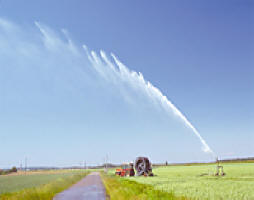 Preliminary study 2/2, Naples 1997
Preliminary study 2/2, Naples 1997
| Released | 10/05/2006 |
|---|
IV A. Program for the setting up and activities of EMWIS
The setting up of EMWIS can only be achieved by way of a simple, pragmatic, progressive and feasible strengthening program.
This program must emphasize from the start the advantage of the system and allow for a progressive integration of the partners. It could be broken down as follows:
1.In the short term (1998 - 2000)
- Organization of EMWIS's management structures.
- Development of access to information on priority topics :
- Organization of the communication network;
- Preparation of and access to directories (institutions, operators, people, ...) and catalogues of information sources in the 27 countries;
- Development of common accesses to existing information systems;
- Development of access to information which is not yet digitized (paper files, microfiches ...);
- Extension of access processes to additional languages (other than French and English);
- Elaboration of common programmes and outputs to develop available information;
Remark: the improvement of access to available information may, in some cases, be achieved by developing specialized tools for access, retrieval and dissemination of information.
2. In the medium term (3 to 5 years)
- Extension to additional and new topics;
- Creation of information systems on non-covered sectors with the organization of common work programmes (information collection, validation and dissemination) and the elaboration of common outputs to develop available information.
 |
The Coordination Committee comprises a Technical Unit and the representatives of the National Focal Points involved in the project.
The Technical Unit is composed of a consortium of operators of several countries. The provisional list of these operators is as follows : IOW (France), CEDEX (Spain), Hydrocontrol (Italy), WRc (United Kingdom). These operators constitute a permanent structure which is responsible for carrying out the actions defined with the National Focal Points while respecting the general orientations defined by the Management Committee.
This Technical Unit is responsible for:
- Proposing to the Steering Committee the main strategic orientations, annual action plans and budgets, defined with the National Focal Points;
- Coordinating, driving, and should the case arise, providing a technical
support to the activities of the National Focal Points:
- Possible assistance for the detailed identification of human and equipment needs;
- Organization of the necessary training programmes;
- Assistance to the elaboration of the directories and references;
- Organization of the information collection supervised by the National Focal Points;
- Organization of the approval procedures of the national information sources;
- Support to the organization of access to information on National Focal Points’ servers
- Assistance to the elaboration of common outputs;
- Carrying out the tasks of the "Focal Point of International
Organizations" :
- Inventory and agreement of international data sources;
- Translation of protocols of information access into the official languages of EMWIS;
- Development of access to international information sources;
- Developing and managing the information server of the Coordination
Committee :
- Development of access applications and procedures;
- Entry and integration of the information foreseen at this stage;
- Management of communications with the users and NFPs;
- Development of specialized tools for research, access and dissemination.
# Organization of the Technical Unit :
The Technical Unit should have a legal status allowing it to combine the
competences of several organizations and to mobilize the funds necessary for
its activities (see the list of tasks to be carried out in the preceding
chapter).
Besides, it will have premises and necessary equipment means at its disposal for organizing meetings and developing the information system at international level.
The coordination with National Focal Points will be implemented by way of regular meetings and by intensive use of video-conferencing.
- Corresponding minimum human resources:
- 1 full-time coordinator
- 1 computer expert (engineer)
- 1 multilingual assistant
- Several information managers who can be residents of various countries.
- Required equipment :
- Adequate premises with a conference room;
- Computer material (equipment of the permanent staff and Internet server);
- Advanced communication means (high-flux Internet access, video-conferencing equipment...)
Remark:
The option aiming at providing the Technical Unit with sufficient
premises for receiving full-time information managers from several
countries, appeared to be too " heavy " for being chosen at this
stage.
The Steering Committee is composed of :
- The representatives of 10 countries (1 representative per country with the possibility of alternating countries from one year to another with the exception of the countries which are members of the Technical Unit (see below) and which constitute the core of the Management Committee);
- A representative of the European Commission
It is responsible for:
- Defining the main strategic orientations:
- Legal aspects and the international status of EMWIS;
- General economy of EMWIS in order to ensure its sustainable operation;
- Validating the results obtained in each phase;
- Validating EMWIS annual action plan and budget proposed by the Coordination Committee.
The Committee meets once a year with alternate organization of the meetings.
National Focal Point Organization
Each country controls the organization of its National Focal Point.
Generally speaking, the National Focal Points will be mainly responsible for :
- Participating in coordination and information meetings organized by the Coordination Committee (physical participation or by video-conferencing, depending on the case );
- Making an inventory and approving, according to the orientations defined by the Coordination Committee, the sources of available information in the country, that can be accessed through EMWIS;
- Organizing the procedures of communication and access to approved information in the country;
- Ensuring that the protocols of access to information are translated and available in the official EMWIS languages
- Developing, whenever necessary and according to the standards defined by the Coordination Committee, the tools and interface software which will facilitate access to homogeneous information in the country;
- Ensuring relations with the country’s users (analyses of the users' satisfaction, identification of new requirements ...);
- Contributing to the elaboration of the annual action programme of the Coordination Committee's Technical Unit .
# Organization recommended for an optimum operation of the National Focal Points:
Remark: as the organization of the National Focal Points is the responsibility of the countries, this chapter only intends to provide some indications on the organization that would seem a-priori advisable for an optimum operation of the National Focal Point.
A small team (3 persons) assigned by the relevant authorities to the EMWIS project, within a public or parapublic organization in charge of gathering and disseminating documentation and information relating to the water sector in each country.
This team would have the means necessary for coordinating the tasks (premises, telecommunication, video-conferencing...) and for developing the information system used at national level.
- Corresponding human resources :
- 1 full-time coordinator;
- 1 computer expert (network-specialized engineer and webmaster);
- 1 multilingual assistant.
- Required equipment :
- Adequate premises with a conference room and office space for receiving the partners;
- Computer material (equipment for the permanent staff and specific Internet server);
- Advanced communication means (access to Internet through specialized connections, video-conferencing equipment....).
V. IMPLEMENTATION COST AND FUNDING
The table hereafter shows a first estimate of the necessary budgets to implement EMWIS project during the development period (1998-2000) and presents a cost distribution over three years.
This budget proposal includes 3 main components:
1. The "International Level " component covers the setting up and operating costs of the coordination structures at international level as well as the reinforcement of international communication links to enable exchanges on Internet with guaranteed quality;
2. The "National Focal Points " component covers the NFPs' investment and operating costs (estimated average value) that are directly incurred by the setting up of EMWIS (excluding premises and wages);
3. The "Technical Assistance/Training/Evaluation" component covers general expenses regarding the international level as well as NFPs: technical assistance, training, promotion of EMWIS in the countries.
The costs used to draw up this table are detailed in annex 10.
As regards the "International Level":
- The budget of the "Management Committee " should allow for the organization of annual meetings of the Management Committee;
- The "Investment cost for the Technical Unit" includes the hardware, software and office equipment necessary for its operation;
- The " Operating costs of the Technical Unit"
cover:
- Premises rental costs, communication costs (connection, subscription to Internet, telephone and fax), hardware and software maintenance, translation, organization of coordination meetings, travel expenses;
- Salaries of the full time project manager, computer expert and assistant.
- The budget of the "International Communication Network with guaranteed quality " is meant to facilitate, on one hand, the development of Internet links between TEN34 and RAITNET networks and, on the other hand, to connect some countries to one of these two networks;
Regarding the "National Focal Points", the total amount has been calculated while taking for granted that ten countries will join EMWIS within the first year and ten other countries within the second year (meaning a total of twenty countries). The indicated mean unit costs will have to be revised for each country on a case by case basis. They include:
- Investment costs which correspond to the hardware and software equipment considered as necessary for the good running of NFPs;
- Operating costs which cover communication expenses (connection costs, subscription to Internet, telephone and fax), hardware and software maintenance, translation, organization of coordination meetings, travel expenses, specifically to participate in training courses and coordination meetings.
Regarding the item "Technical Assistance/Training/Evaluation":
- The Technical Assistance budget has been planned to finance the intervention of experts to give technical assistance for the following in particular:
- Organization and setting up of the international communication network;
- Organization of directories and catalogues (directory structure, definition of references, references used, organization of data collection, defining quality references, defining validation procedures);
- Back-up for developing access to available information (thesaurus organization, dictionaries harmonization and standardization, defining exchange formats, developing exchange interfaces...)
- Back -up for organizing access to information not yet digitized;
- Back-up for developing research tools;
- Back-up for preparing common products for information development;
- ...
- Regarding the "Training" budget, the following organization has been
planned:
- A one-week training course per year for the computer scientists working in National Focal Points and in the Technical Unit;
- A training course about quality concepts (one week) for the National Focal Points Managers;
- A One-year training programme for the coordination of Focal Points Managers regarding information collection, management and discussions.
- The budget for an "Information Seminar in the Countries" should cover the organization of an awareness raising meeting for national operators in each country; at least two representatives of the Coordination Committee should participate in this meeting in order to inform about and analyze the expectations towards EMWIS.
- The budget for a "final evaluation of the 3-year program" will cover a technical and financial assessment of the operations carried out during the development period and the identification of a series of proposals to continue EMWIS activities. This assessment will be undertaken by an operator who is outside the system.
The conditions for funding this program will be defined later on.
The following principles could then be taken into consideration:
- Each country takes charge of the funding of its national focal point;
- International expenses will be taken care of by sharing the cost between the countries of the European Union involved in EMWIS's Technical Unit and the European Commission.
|
EMWIS BUDGET |
COST |
COST |
COST |
TOTAL |
|
PERIOD 1998-2000 |
YEAR 1 |
YEAR 2 |
YEAR 3 |
|
|
EURO |
EURO |
EURO |
EURO |
|
|
INTERNATIONAL LEVEL |
||||
|
Steering Committee Meetings |
30 769 |
30 769 |
30 769 |
92 308 |
|
Investment cost for the Technical Unit |
93 692 |
93 692 |
||
|
Operating cost of the Technical Unit |
373 692 |
373 692 |
373 692 |
1 121 077 |
|
Support to the international communication network |
61 538 |
46 154 |
46 154 |
153 846 |
|
Sub-total "international level" |
559 692 |
450 615 |
450 615 |
1 460 923 |
|
NATIONAL FOCAL POINTS (NFP) |
||||
|
(expenses directly linked to EMWIS) |
||||
|
(on the basis of 10 countries the first year and 20 from the second year) |
||||
|
Investment cost (12 769 euro/country) |
127 692 |
127 692 |
255 385 |
|
|
Operating cost (27 692 euro/year/country) |
276 923 |
553 846 |
553 846 |
1 384 615 |
|
Sub-total "National Focal Points" |
404 615 |
681 538 |
553 846 |
1 640 000 |
|
TECHNICAL ASSISTANCE/TRAINING/EVALUATION |
||||
|
Technical assistance |
76 923 |
138 462 |
76 923 |
292 308 |
|
Training |
138 462 |
92 308 |
92 308 |
323 077 |
|
Information seminar in the countries |
50 000 |
71 538 |
60 769 |
182 308 |
|
Final evaluation of the 3-year programme |
45 000 |
45 000 |
90 000 |
|
|
Sub-total "Technical assistance/training/evaluation" |
265 385 |
347 308 |
275 000 |
887 692 |
|
TOTAL |
1 229 692 |
1 479 462 |
1 279 462 |
3 988 615 |
 you are not logged in
you are not logged in





